When you think about Tuscany, you think about world’s heritage, really. I think most people see it as a destination and not as somebody’s home. I have already written about this in the past (check this post). Of course, everything is relative, even the concept of what is “foreign“.
If you are not born and bred Tuscan you will always be a foreigner to the locals. And interestingly enough, the dialectal word for it has the same roots as the English one: forestiero. Travellers to the area will be tagged as forestieri. Expats, no matter when they first showed up, are and will always be forestieri. Even the children of those expats or of the people who have migrated to Tuscany from other parts of Italy or from abroad will always be forestieri, regardless of whether they were born and raised here. You need a real Tuscan “pedigree” to be freed of that label.
And yet, Tuscany is a very welcoming place. Not only with the “prestige immigrants”, those coming from countries such as the UK, or from North America (there are so many English speaking people in some areas, that the Chianti region is also known as Chiantishire!). Also people who come from countries that don’t benefit of such a benevolent reputation among the locals will be welcomed.
The funniest thing is when you hear people talk about immigrants (be they from other first world countries or not). You won’t hear many positive things. But then you will see them hand in hand with the many foreigners living in small communities like ours (in fact, if they’re still alive is mostly because of immigrants who come and live here and have children). And when you ask why they criticize immigrants then, you will get the same answer over and over: “these are good people, they are the exception”. Yes, and the exception is that they get to know these people and figure out that we are not so different after all. That we share more than we think.
I remember when I was a kid, our society was extremely monocultural. Now even our small village is multiethnic. Some people think this is a bad thing, a loss of identity. Others, like me, think this is history in the making. And not necessarily a bad thing. The world changes and we need to change with it, while still preserving our identity, sure, but being open, and welcoming to what is now foreign. One day, it might be an integral part of our new identity.
I would like to recommend a book, written by a very bright lady, Katja Meier. She is herself a forestiera. And she wrote about her experience working in a refugee home around here. She has chosen Dogana as the fictional name of the village in which her book is set. The village exists and it’s near here. It means “customs” so it is somewhat a play on words. The home is not in that village, but if you are curious to explore the area, you might want to stop by and enjoy the countryside at least. The book is available here Across the Big Blue Sea.
Italy Blogging Roundtable
This is a post in a monthly series called The Italy Blogging Roundtable. Here you can find the posts of the other bloggers who participate in the roundtable. Our topic this month was “other/foreign”:

- Italy Explained – The 5 Letters of the Alphabet Banned by Mussolini
- ArtTrav – Refugees in Tuscany: New Book Questions Preconceptions
- Brigolante – coming soon
- Italofile – From Foreign Language to Lingua Franca: Italian Immersion Programs in Italy
- Driving like a maniac – coming soon
- Bleeding Espresso – coming soon
- Ciao Amalfi – Italy Roundtable: The Rush of the Strange and Unfamiliar
- Girl in Florence – 50 Shades of “Foreign” in Florence, Italy
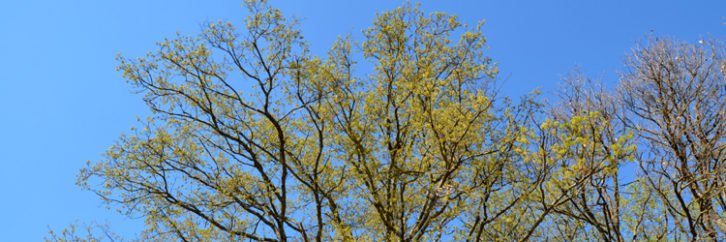

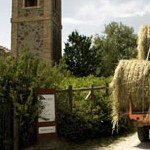

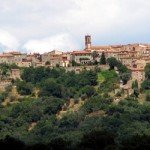


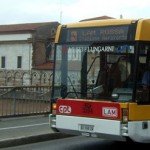

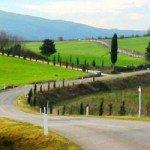


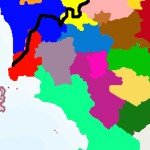



It’s funny, but reading your comment about ‘forestieri’ reminded me of something. My Mamma’s Nonno remarried 8 days after his wife passed away and it caused a huge scandal in the paese. The scandal was not because his wife had only died 8 days earlier, but because he married a ‘straniera’. She was from Montaguto, a village in Campania (we are in Puglia) 4 km away! I always laugh when I think of my Mamma telling this story! Ciao, Cristina
omg, scandal!!!
Absolutely. My great-grandmother was from northern Italy, and when my great-grandfather “brought her back” as a “war trophy”, everybody knew her as “la tedesca”, the German. She was from a German speaking area near Trieste in fact, so totally Italian! And that’s the name people still remember her around here. The typical question you get asked by older people who are not sure who you are is “Di chi sei?” (literally, who do you belong to?). And when I was a kids and I answered with my dad’s name, the older people would always go “Oh right, the German’s grandson’s!”).
Nice thoughts Gloria, and it’s great to have you back writing a post again!
Let’s see how long it lasts… LOL
Really enjoyed this post Gloria. It makes me think about how it must have been hard even for other Italians moving to a different part of the country. I remember my Italian ex boyfriend telling me about how his uncle caused a stir in the family by marrying a woman from Puglia, something that even 40 years later would be brought up at the dinner table.. albeit in jest by this point.
It really does matter where you’re from in Italy! I’ve noticed that it makes a difference even which village you live in on the Amalfi Coast. About 20 years ago my husband moved to a village near Amalfi (but we can see Amalfi from the window), and he says he still feels like a foreigner. Well there goes me trying to fit in … haha!
So true Laura!